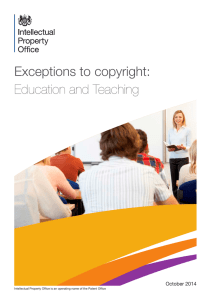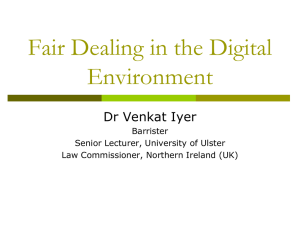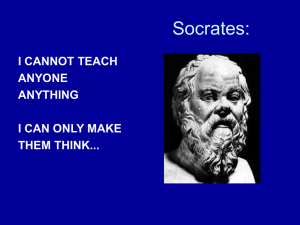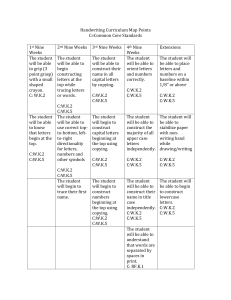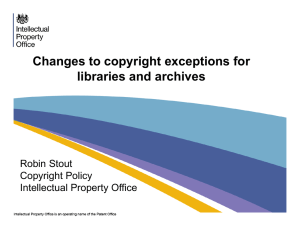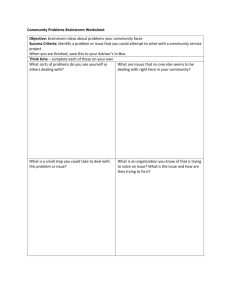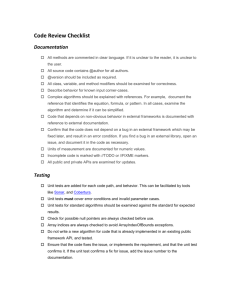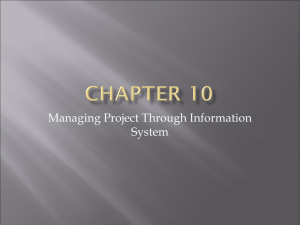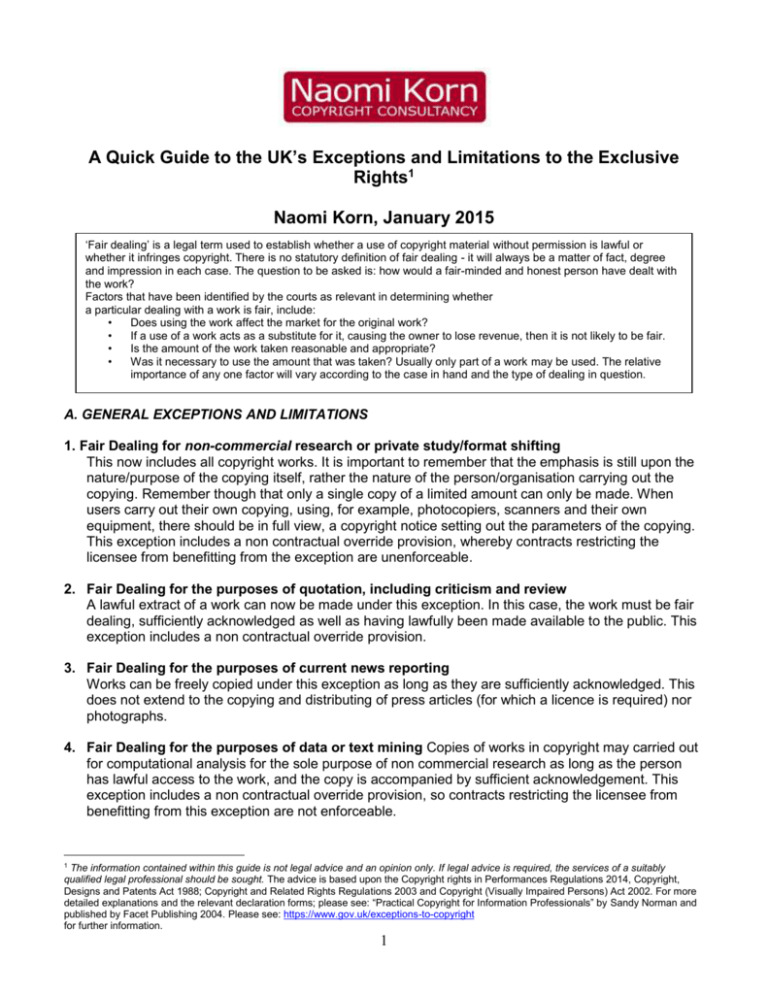
A Quick Guide to the UK’s Exceptions and Limitations to the Exclusive
Rights1
Naomi Korn, January 2015
‘Fair dealing’ is a legal term used to establish whether a use of copyright material without permission is lawful or
whether it infringes copyright. There is no statutory definition of fair dealing - it will always be a matter of fact, degree
and impression in each case. The question to be asked is: how would a fair-minded and honest person have dealt with
the work?
Factors that have been identified by the courts as relevant in determining whether
a particular dealing with a work is fair, include:
•
Does using the work affect the market for the original work?
•
If a use of a work acts as a substitute for it, causing the owner to lose revenue, then it is not likely to be fair.
•
Is the amount of the work taken reasonable and appropriate?
•
Was it necessary to use the amount that was taken? Usually only part of a work may be used. The relative
importance of any one factor will vary according to the case in hand and the type of dealing in question.
A. GENERAL EXCEPTIONS AND LIMITATIONS
1. Fair Dealing for non-commercial research or private study/format shifting
This now includes all copyright works. It is important to remember that the emphasis is still upon the
nature/purpose of the copying itself, rather the nature of the person/organisation carrying out the
copying. Remember though that only a single copy of a limited amount can only be made. When
users carry out their own copying, using, for example, photocopiers, scanners and their own
equipment, there should be in full view, a copyright notice setting out the parameters of the copying.
This exception includes a non contractual override provision, whereby contracts restricting the
licensee from benefitting from the exception are unenforceable.
2. Fair Dealing for the purposes of quotation, including criticism and review
A lawful extract of a work can now be made under this exception. In this case, the work must be fair
dealing, sufficiently acknowledged as well as having lawfully been made available to the public. This
exception includes a non contractual override provision.
3. Fair Dealing for the purposes of current news reporting
Works can be freely copied under this exception as long as they are sufficiently acknowledged. This
does not extend to the copying and distributing of press articles (for which a licence is required) nor
photographs.
4. Fair Dealing for the purposes of data or text mining Copies of works in copyright may carried out
for computational analysis for the sole purpose of non commercial research as long as the person
has lawful access to the work, and the copy is accompanied by sufficient acknowledgement. This
exception includes a non contractual override provision, so contracts restricting the licensee from
benefitting from this exception are not enforceable.
1
The information contained within this guide is not legal advice and an opinion only. If legal advice is required, the services of a suitably
qualified legal professional should be sought. The advice is based upon the Copyright rights in Performances Regulations 2014, Copyright,
Designs and Patents Act 1988; Copyright and Related Rights Regulations 2003 and Copyright (Visually Impaired Persons) Act 2002. For more
detailed explanations and the relevant declaration forms; please see: “Practical Copyright for Information Professionals” by Sandy Norman and
published by Facet Publishing 2004. Please see: https://www.gov.uk/exceptions-to-copyright
for further information.
1
5. Fair Dealing for the purposes of illustration for instruction purposes A copy of a copyright work
can be used for the sole purpose of illustration for instruction as long the use is for a non commercial
purpose, the person making the copy is giving or receiving instruction and the copy is accompanied
by a sufficient acknowledgement. This could include setting or answering questions. This exception
includes a non contractual override provision, so contracts restricting the licensee from benefitting
from this exception are not enforceable.
6. Fair Dealing for the purposes of parody, caricature and pastiche
A fair dealing copy of a copyright work can be used for the purposes of parody, caricature and
pastiche. Contracts restricting the licensee from benefitting from this exception are not enforceable.
B. EXCEPTIONS FOR LIBRARIES, ARCHIVES, MUSEUMS, GALLERIES AND EDUCATIONAL
ESTABLISHMENTS
1. Making works available on dedicated terminals
A copy of a work can be made available to individual members of the public via a dedicated terminal
on the premises of libraries, archives, museums, galleries and educational establishments, as long
as the work has been lawfully acquired by the institutions, it is for the public’s research or private
study and there are not any licensing/purchase terms which prevent this.
2. Copying for preservation or replacement
As long as it is not reasonably practical to purchase a copy2, librarians, archivists, curators and those
working in libraries, archives, museums, galleries and educational establishments can make or have
made for them preservation copies of items in their reference collections on their premises (or
permanent collection if only available for loan to other libraries, archives or museums) or if their copy
is lost, destroyed or damaged. Contracts restricting the licensee from benefitting from this exception
are not enforceable.
C. LIBRARY PRIVILEGES
1. Copying by Librarians and Archivists for users
From 1 June 2014, librarians and archivists can make copies for users of all works in copyright. The
copying must be for the purposes of non-commercial research or private study and only a single
copy of a limited amount can be provided. For example, one article from a journal or a
reasonable amount of any other published work. If a charge is made, these must be based on the
costs attributable to the production of the copy.
Librarians are legally obliged that all their users declare in writing before a single copy of a limited
amount of a work can be made for them to protect the librarians against infringements and also to
prevent systematic copying. Prior to 1 June 2014, a Declaration Form had to be used, but now the
declaration can be in writing which includes email and other forms of electronic communication.
Librarians can copy the whole or part of unpublished literary, dramatic of musical works held in the
library or archive for the purposes of non-commercial research or private study. In these cases, the
user must make a declaration in writing (including electronic forms of writing), in which the user must
be sure that the material has not been published before being deposited in the library or archive and
the copyright holder has not prohibited the copying at the time that the copy is made.
Contracts restricting the licensee from benefitting from this exception are not enforceable.
Note that copying under the CLA Licence removes the requirement to request a declaration in
writing.
2
To be decided by the Librarian
2
2. Interlibrary loans
Librarians can request single copies of items from other libraries as long as they have tried to find the
rights holders but were unsuccessful, (unless it is an article in a periodical), and the requesting library is
not conducted for profit. Copies obtained for stock are legitimate copies and must be placed in the library
collection. If a charge is made, the sum charged must be calculated based on a cost recovery basis.
Contracts restricting the licensee from benefitting from this exception are not enforceable.
D. EXCEPTIONS FOR EDUCATIONAL ESTABLISHMENTS ONLY
1. Copying and use of extracts
The copying of extracts of a relevant work by or on behalf of an educational establishment can be made
as the copy is made for the purposes of instruction for a non commercial purpose and the copy is
accompanied by a sufficient acknowledgement. This would include use in teaching and also use via a
secure electronic network as long at is accessible only to the educational establishment’s pupils and
staff. This excludes broadcasts and artistic works. No more than 5% of a work can be copied in any 12
month period. Licensing terms, such as a CLA licence will take precedence.
2. Off-air recording for educational purposes
Off-air recordings from broadcasts can be made by, or on behalf of an educational establishments for
non-commercial purposes as long as there is no certified licensing scheme available and the recording
or copy is accompanied by a sufficient acknowledgement. This now extends to recordings which are
received outside the premises of the establishment as long as it is delivered by a secure electronic
network. In this instance, only off-air recordings made from satellite and cable channels may be recorded
without a licence, since for these, no licensing scheme currently exists. For other purposes, the terms of
the ERA+ licence will apply.
3. Performing a literary, dramatic or musical work
Literary, dramatic or musical works can be performed for non-public purposes, such as examinations,
during the course of instruction and similar purposes as long as the audience comprises of students and
teachers. Any other audience will need an appropriate licence such as those offered by PRS and PPL
for the public performance of music.
E. EXCEPTIONS FOR DISABLED USERS REVISED
New legislation now provides specific exceptions permitting copying for, or by users with a disability. The
whole of part of an accessible work can be supplied, as long as the user, or authorised body (an
educational establishment or an organisation not established for profit) has lawfully obtained a copy a
work for which they are unable to access, an accessible is not commercially available and the accessible
copy is for the user’s personal use. If the commercially available copy is not suitable, then an accessible
copy can be created.
© Naomi Korn, 2015. Some Rights Reserved. The information here is licensed for use under a Creative Commons
Attribution Share Alike Licence (CC BY SA)
3

